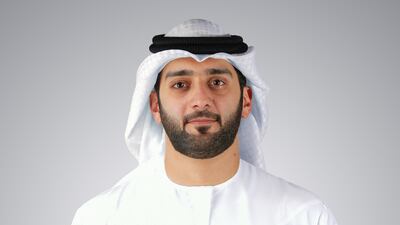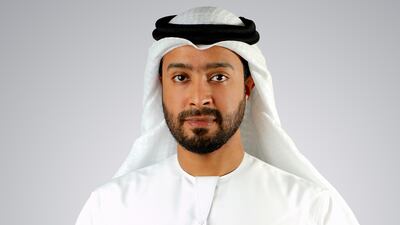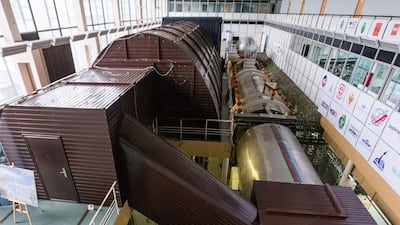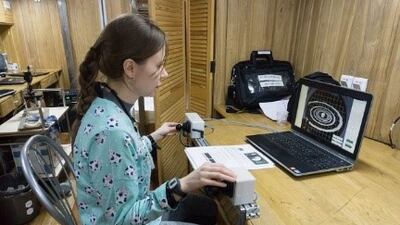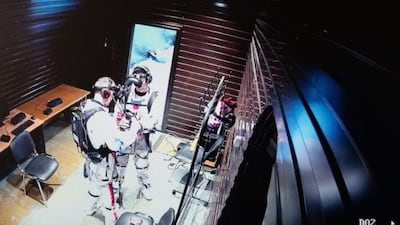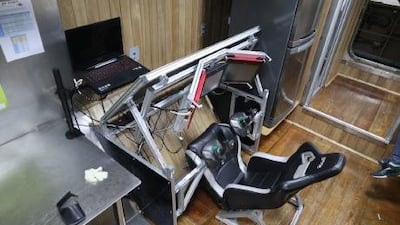Two Emiratis will be part of a space research programme that involves living in near-isolation for eight months to replicate the challenges of flights to the Moon and Mars.
The names of the two citizens — one of whom will take part in the arduous mission and the other a backup — will be announced soon, the Mohammed bin Rashid Space Centre said.
The pair have been selected from a shortlist of ten candidates announced last year.
The mission will involve an international crew of six people living inside the NEK experimental complex in Moscow for eight months.
Sirius 20/21, the official name of the project, will measure the psychological and physiological impact on humans living in the extreme environments that astronauts would face during space travel.
As space nations work towards landing humans on Mars, research into how lengthy space flights affect the human body and mind remains critical. Astronauts will have to overcome challenges such as exposure to radiation, long periods of time spent in microgravity and long periods away from family and friends.
“The mission is part of the Scientific International Research in Unique Terrestrial Station (Siruis) and will study the effects of long duration isolation and confinement,” the space centre said.
“The members of crew one will be revealed soon. The crew will join the UAE Analog Mission 1 — the first Emirati analog mission.”
After a delay caused by the Covid-19 pandemic, the experiment is expected to begin in November.
The National explains what the project will involve.
Simulation of a space-like environment
The experiment is part of a five-year-long research programme by Russia’s Institute of Biomedical Problems and Nasa’s Human Research Programme.
It involves three Sirius missions, with the first one completed in 2019 when six crew members lived in isolation for four months.
The final one is expected to be 12 months long and to be the most challenging.
Participants will be sealed inside tubular modules, with multiple cameras watching them around the clock.
The structure has its own atmosphere and air pressure to create a space-like environment.
Dedicated rooms for each participant will help with privacy, while a small living room will allow them to socialise and watch television.
Each bedroom has a tiny bed, desk and a cupboard.
They will be cut off from the world outside for the entire duration of the experiment.
What is the scientific purpose?
The crew members will be assigned simulated space missions during their stay in the facility.
“Participants will experience environmental aspects similar to those astronauts are expected to experience on future missions to Mars,” Nasa said on its website.
“A small international crew will live together in isolation for eight months conducting scientific research, using virtual reality and performing robotic operations among a number of other tasks during the lunar mission.
“Results from ground-based missions like this help Nasa prepare for the real-life challenges of space exploration and provide important scientific data to solve some of these problems and to develop countermeasures.”
Scientists will be measuring the participants’ psychological and physiological conditions during the experiment.
Why is the UAE participating?
The UAE has long-term plans to send Emiratis to the lunar surface and to build a human settlement on Mars by 2117.
The Mohammed bin Rashid Space Centre is building a Dh500 million Mars simulation city in Dubai, with construction expected to begin next year.
The design includes analog facilities that can be used by Emiratis and other international participants in the future.
“The Mars Science City will be a platform where we’re going to have our future space robotics lab, future analog facilities, a habitat and a space sustainability lab,” Adnan Al Rais, Mars 2117 programme manager, said.
“We’re currently working on the design. Then we’ll do the construction for the next two years. Hopefully, the city will be ready and operational towards the end of 2024.
“We are also working with our partners on identifying the requirements for unique analogue facilities as part of the Mars Science City.”
Remarkable images of the UAE from space — in pictures
57%20Seconds
%3Cp%3E%3Cstrong%3EDirector%3A%3C%2Fstrong%3E%20Rusty%20Cundieff%0D%3Cbr%3E%3Cstrong%3EStars%3A%20%3C%2Fstrong%3EJosh%20Hutcherson%2C%20Morgan%20Freeman%2C%20Greg%20Germann%2C%20Lovie%20Simone%0D%3Cbr%3E%3Cstrong%3ERating%3A%20%3C%2Fstrong%3E2%2F5%0D%3Cbr%3E%0D%3Cbr%3E%3C%2Fp%3E%0A
Dubai Bling season three
Cast: Loujain Adada, Zeina Khoury, Farhana Bodi, Ebraheem Al Samadi, Mona Kattan, and couples Safa & Fahad Siddiqui and DJ Bliss & Danya Mohammed
Rating: 1/5
The%20specs%3A%202024%20Mercedes%20E200
%3Cp%3E%3Cstrong%3EEngine%3A%20%3C%2Fstrong%3E2.0-litre%20four-cyl%20turbo%20%2B%20mild%20hybrid%0D%3Cbr%3E%3Cstrong%3EPower%3A%20%3C%2Fstrong%3E204hp%20at%205%2C800rpm%20%2B23hp%20hybrid%20boost%0D%3Cbr%3E%3Cstrong%3ETorque%3A%20%3C%2Fstrong%3E320Nm%20at%201%2C800rpm%20%2B205Nm%20hybrid%20boost%0D%3Cbr%3E%3Cstrong%3ETransmission%3A%20%3C%2Fstrong%3E9-speed%20auto%0D%3Cbr%3E%3Cstrong%3EFuel%20consumption%3A%20%3C%2Fstrong%3E7.3L%2F100km%0D%3Cbr%3E%3Cstrong%3EOn%20sale%3A%20%3C%2Fstrong%3ENovember%2FDecember%0D%3Cbr%3E%3Cstrong%3EPrice%3A%20%3C%2Fstrong%3EFrom%20Dh205%2C000%20(estimate)%3C%2Fp%3E%0A
What the law says
Micro-retirement is not a recognised concept or employment status under Federal Decree Law No. 33 of 2021 on the Regulation of Labour Relations (as amended) (UAE Labour Law). As such, it reflects a voluntary work-life balance practice, rather than a recognised legal employment category, according to Dilini Loku, senior associate for law firm Gateley Middle East.
“Some companies may offer formal sabbatical policies or career break programmes; however, beyond such arrangements, there is no automatic right or statutory entitlement to extended breaks,” she explains.
“Any leave taken beyond statutory entitlements, such as annual leave, is typically regarded as unpaid leave in accordance with Article 33 of the UAE Labour Law. While employees may legally take unpaid leave, such requests are subject to the employer’s discretion and require approval.”
If an employee resigns to pursue micro-retirement, the employment contract is terminated, and the employer is under no legal obligation to rehire the employee in the future unless specific contractual agreements are in place (such as return-to-work arrangements), which are generally uncommon, Ms Loku adds.
The specs
Engine: 3.0-litre six-cylinder MHEV
Power: 360bhp
Torque: 500Nm
Transmission: eight-speed automatic
Price: from Dh282,870
On sale: now
Specs
%3Cp%3E%3Cstrong%3EEngine%3A%3C%2Fstrong%3E%201.5-litre%20turbo%204-cylinder%20%2F%202.0%20turbo%204-cylinder%20(S3)%0D%3Cbr%3E%3Cstrong%3EPower%3A%3C%2Fstrong%3E%20148bhp%20%2F%20328bhp%20(S3)%0D%3Cbr%3E%3Cstrong%3ETorque%3A%3C%2Fstrong%3E%20250Nm%20%2F%20420Nm%20(S3)%0D%3Cbr%3E%3Cstrong%3EOn%20sale%3A%3C%2Fstrong%3E%20December%0D%3Cbr%3E%3Cstrong%3EPrice%3A%3C%2Fstrong%3E%20TBA%0D%3C%2Fp%3E%0A
Quick facts on cancer
- Cancer is the second-leading cause of death worldwide, after cardiovascular diseases
- About one in five men and one in six women will develop cancer in their lifetime
- By 2040, global cancer cases are on track to reach 30 million
- 70 per cent of cancer deaths occur in low and middle-income countries
- This rate is expected to increase to 75 per cent by 2030
- At least one third of common cancers are preventable
- Genetic mutations play a role in 5 per cent to 10 per cent of cancers
- Up to 3.7 million lives could be saved annually by implementing the right health
strategies
- The total annual economic cost of cancer is $1.16 trillion
It Was Just an Accident
Director: Jafar Panahi
Stars: Vahid Mobasseri, Mariam Afshari, Ebrahim Azizi, Hadis Pakbaten, Majid Panahi, Mohamad Ali Elyasmehr
Rating: 4/5
Shipping%20and%20banking%20
%3Cp%3EThe%20sixth%20sanctions%20package%20will%20also%20see%20European%20insurers%20banned%20from%20covering%20Russian%20shipping%2C%20more%20individuals%20added%20to%20the%20EU's%20sanctions%20list%20and%20Russia's%20Sberbank%20cut%20off%20from%20international%20payments%20system%20Swift.%3C%2Fp%3E%0A
Emergency phone numbers in the UAE
Estijaba – 8001717 – number to call to request coronavirus testing
Ministry of Health and Prevention – 80011111
Dubai Health Authority – 800342 – The number to book a free video or voice consultation with a doctor or connect to a local health centre
Emirates airline – 600555555
Etihad Airways – 600555666
Ambulance – 998
Knowledge and Human Development Authority – 8005432 ext. 4 for Covid-19 queries
UAE currency: the story behind the money in your pockets
UK’s AI plan
- AI ambassadors such as MIT economist Simon Johnson, Monzo cofounder Tom Blomfield and Google DeepMind’s Raia Hadsell
- £10bn AI growth zone in South Wales to create 5,000 jobs
- £100m of government support for startups building AI hardware products
- £250m to train new AI models
PROFILE OF HALAN
Started: November 2017
Founders: Mounir Nakhla, Ahmed Mohsen and Mohamed Aboulnaga
Based: Cairo, Egypt
Sector: transport and logistics
Size: 150 employees
Investment: approximately $8 million
Investors include: Singapore’s Battery Road Digital Holdings, Egypt’s Algebra Ventures, Uber co-founder and former CTO Oscar Salazar
Kandahar%20
%3Cp%3E%3Cstrong%3EDirector%3A%3C%2Fstrong%3E%20Ric%20Roman%20Waugh%3C%2Fp%3E%0A%3Cp%3E%3Cstrong%3EStars%3A%C2%A0%3C%2Fstrong%3EGerard%20Butler%2C%20Navid%20Negahban%2C%20Ali%20Fazal%3C%2Fp%3E%0A%3Cp%3E%3Cstrong%3ERating%3A%3C%2Fstrong%3E%202.5%2F5%3C%2Fp%3E%0A
Tips%20for%20travelling%20while%20needing%20dialysis
%3Cul%3E%0A%3Cli%3EInform%20your%20doctor%20about%20your%20plans.%C2%A0%3C%2Fli%3E%0A%3Cli%3EAsk%20about%20your%20treatment%20so%20you%20know%20how%20it%20works.%C2%A0%3C%2Fli%3E%0A%3Cli%3EPay%20attention%20to%20your%20health%20if%20you%20travel%20to%20a%20hot%20destination.%C2%A0%3C%2Fli%3E%0A%3Cli%3EPlan%20your%20trip%20well.%C2%A0%3C%2Fli%3E%0A%3C%2Ful%3E%0A
The specs: 2018 Range Rover Velar R-Dynamic HSE
Price, base / as tested: Dh263,235 / Dh420,000
Engine: 3.0-litre supercharged V6
Power 375hp @ 6,500rpm
Torque: 450Nm @ 3,500rpm
Transmission: Eight-speed automatic
Fuel consumption, combined: 9.4L / 100kms
NYBL PROFILE
Company name: Nybl
Date started: November 2018
Founder: Noor Alnahhas, Michael LeTan, Hafsa Yazdni, Sufyaan Abdul Haseeb, Waleed Rifaat, Mohammed Shono
Based: Dubai, UAE
Sector: Software Technology / Artificial Intelligence
Initial investment: $500,000
Funding round: Series B (raising $5m)
Partners/Incubators: Dubai Future Accelerators Cohort 4, Dubai Future Accelerators Cohort 6, AI Venture Labs Cohort 1, Microsoft Scale-up
Most%20polluted%20cities%20in%20the%20Middle%20East
%3Cp%3E1.%20Baghdad%2C%20Iraq%3Cbr%3E2.%20Manama%2C%20Bahrain%3Cbr%3E3.%20Dhahran%2C%20Saudi%20Arabia%3Cbr%3E4.%20Kuwait%20City%2C%20Kuwait%3Cbr%3E5.%20Ras%20Al%20Khaimah%2C%20UAE%3Cbr%3E6.%20Ash%20Shihaniyah%2C%20Qatar%3Cbr%3E7.%20Abu%20Dhabi%2C%20UAE%3Cbr%3E8.%20Cairo%2C%20Egypt%3Cbr%3E9.%20Riyadh%2C%20Saudi%20Arabia%3Cbr%3E10.%20Dubai%2C%20UAE%3C%2Fp%3E%0A%3Cp%3E%3Cem%3ESource%3A%202022%20World%20Air%20Quality%20Report%3C%2Fem%3E%3C%2Fp%3E%0A
MOST%20POLLUTED%20COUNTRIES%20IN%20THE%20WORLD
%3Cp%3E1.%20Chad%3Cbr%3E2.%20Iraq%3Cbr%3E3.%20Pakistan%3Cbr%3E4.%20Bahrain%3Cbr%3E5.%20Bangladesh%3Cbr%3E6.%20Burkina%20Faso%3Cbr%3E7.%20Kuwait%3Cbr%3E8.%20India%3Cbr%3E9.%20Egypt%3Cbr%3E10.%20Tajikistan%3Cbr%3E%3Cbr%3E%3Cem%3ESource%3A%202022%20World%20Air%20Quality%20Report%3C%2Fem%3E%3C%2Fp%3E%0A
Countries recognising Palestine
France, UK, Canada, Australia, Portugal, Belgium, Malta, Luxembourg, San Marino and Andorra
What vitamins do we know are beneficial for living in the UAE
Vitamin D: Highly relevant in the UAE due to limited sun exposure; supports bone health, immunity and mood.
Vitamin B12: Important for nerve health and energy production, especially for vegetarians, vegans and individuals with absorption issues.
Iron: Useful only when deficiency or anaemia is confirmed; helps reduce fatigue and support immunity.
Omega-3 (EPA/DHA): Supports heart health and reduces inflammation, especially for those who consume little fish.
Who has lived at The Bishops Avenue?
- George Sainsbury of the supermarket dynasty, sugar magnate William Park Lyle and actress Dame Gracie Fields were residents in the 1930s when the street was only known as ‘Millionaires’ Row’.
- Then came the international super rich, including the last king of Greece, Constantine II, the Sultan of Brunei and Indian steel magnate Lakshmi Mittal who was at one point ranked the third richest person in the world.
- Turkish tycoon Halis Torprak sold his mansion for £50m in 2008 after spending just two days there. The House of Saud sold 10 properties on the road in 2013 for almost £80m.
- Other residents have included Iraqi businessman Nemir Kirdar, singer Ariana Grande, holiday camp impresario Sir Billy Butlin, businessman Asil Nadir, Paul McCartney’s former wife Heather Mills.
Hunting park to luxury living
- Land was originally the Bishop of London's hunting park, hence the name
- The road was laid out in the mid 19th Century, meandering through woodland and farmland
- Its earliest houses at the turn of the 20th Century were substantial detached properties with extensive grounds






























